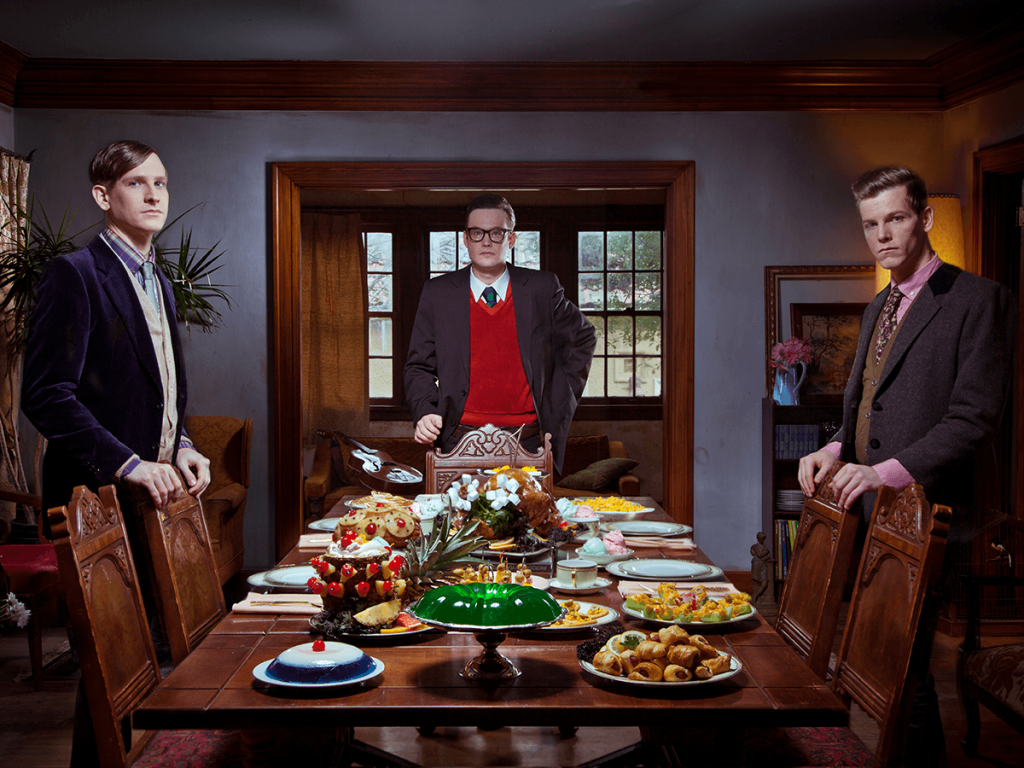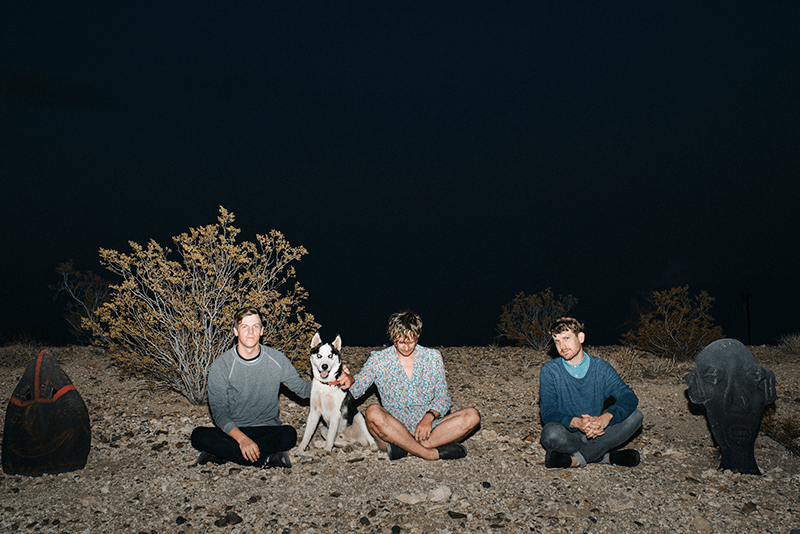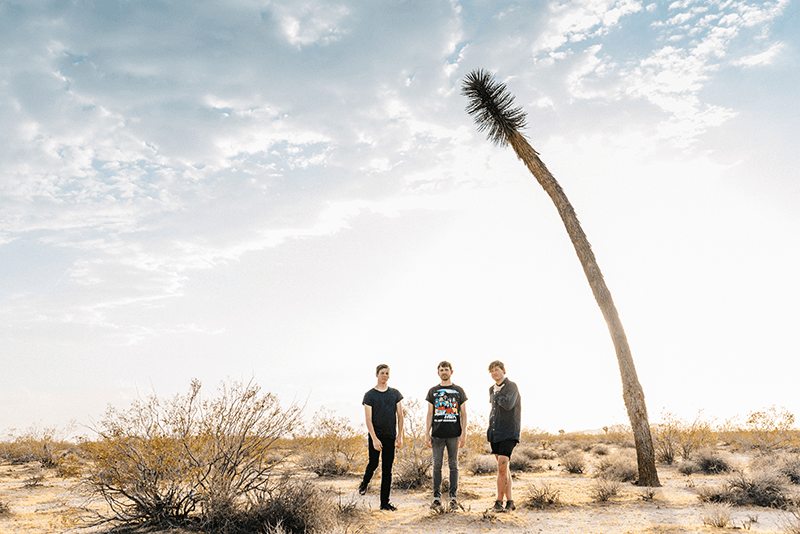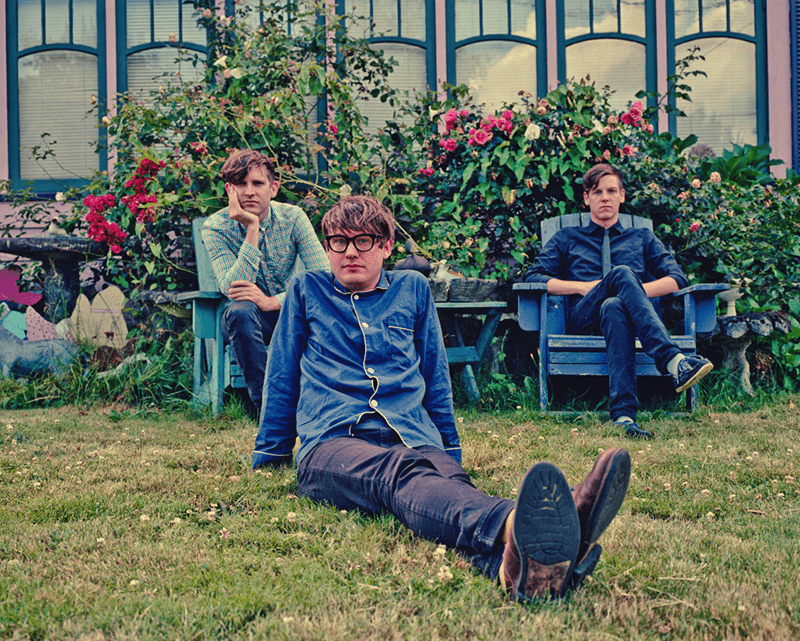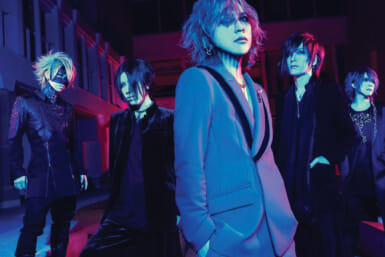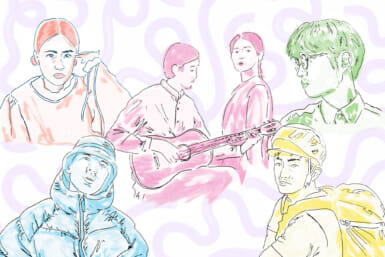Joshua Hodges and his bandmates in the Portland indie-pop outfit STRFKR (pronounced Starfucker) are known for their exuberant live sets, where they randomly swap instruments, unleash confetti and dazzling light shows, and even dress in drag. But when the frontman isn’t touring, he often longs to not only take a break from singing, but speaking altogether, embarking on a literal silent retreat that’s the exact opposite of his frenzied tour schedule.
Ahead of the band’s October 4 performance at Tsutaya O-nest in Shibuya, Hodges tells Weekender about the depression and anxiety that leaves him craving such peace and quiet, his method of coping and even learning from bad reviews, his first exposure to showbiz at his uncle’s cross dressing cabaret gigs, and more.
What were your biggest inspirations while writing and recording your latest album, Being No One, Going Nowhere?
We’d written much of Miracle Mile during a period of heavy touring. For most of the five years leading up to that, we toured almost constantly. I was gone so much that I even gave up renting a place, and just stayed with friends or house sat for people whenever I wasn’t on tour. At one point I was housesitting for a friend in a little down in Oregon called Astoria, where the movie The Goonies was filmed. It was really picturesque and grainy. It looked like a Norwegian village. I was there for three months when we weren’t touring, and I tried to reconnect with myself and slow down. Being alone was really nice, because it’s hard to find alone time on tour. After a while the guys came out and met me, and we did that same thing together — just writing a little, and taking some time to relax and figure out what we were doing next.
Did you have plenty of time to catch up on reading during that time alone in Astoria? One of my favorite STRFKR songs is named after author Kahlil Gibran, and your previous albums had numerous references to philosopher Alan Watts. Can you tell us a little more about how literature influences your music?
I really like Alan Watts because he makes Eastern philosophy so accessible. Through him I learned a lot about Buddhism, and I eventually even started going to Buddhist retreats to help me deal with some severe depression. I learned to meditate on these retreats and just decompress. I’m still interested in that stuff, but when you’re touring it’s hard to practice it. So I’ll go for runs now, which is kind of a lazy person’s meditation. I had signed up to do a three month silent retreat earlier this year, but I ended up going on tour with the band instead. I might sign up again once we’re off the road.
A silent retreat? As in you don’t talk at all?
Yeah, I’ve done a number of 10 day silent retreats. You don’t talk, you don’t read anything, there’s no communication. There are other people there, but that’s mostly just for practical and safety reasons. You otherwise try to pretend that you’re alone. And it’s uncomfortable at first, to slow down and not have stimulation for a few days. But by the end it’s so nice, and I won’t want to leave or start talking again.
How do you pass the time there?
Just simple things like walking in the woods, staring at an ant hill for an hour, noticing bird sounds – all these things that I miss because I’m usually so scatterbrained. There’s even a three year silent retreat, but that’s really fucking intense. It’s not the right time in my life for that [laughs].
But even just doing a short silent retreat is a good way for you to relax after a tour?
Yeah. When the band started, my vision for life became: “If we can make enough money to quit our day jobs, and be a band, then I can just tour and do retreats. Those two things will be my life.” But I underestimated how the touring part would influence my mind. It’s pretty much the exact opposite of a retreat. There’s constant stimulation, no alone time, people talking all the time, always playing music. It can be fun, but coming home from that can feel drastic enough, so going to a silent retreat would feel like even more nothingness [laughs]. My vision didn’t work out, now I get home and think: “Well, should I just watch TV for a while?” So I plan to do a retreat next year but it will be painful at first; I’m scared of it. But it would be a good way to decompress after a tour.
You mentioned how retreats and mediation help you cope with depression. That’s interesting, because fans and critics note how dark and dire your lyrics can be, and how dramatically that contrasts with STRFKR’s upbeat music. Can writing and perfuming such songs be as cathartic as a meditation or retreat?
Definitely. Songwriting is really therapeutic. I worked on these last few records during a period where I’ve dwelled a lot on impermanence and death, and really trying to connect with it. Not in an abstract “We’re all going to die!” attitude, but in a meaningful way. I’ve been thinking a lot about people I know that died recently. My grandfather died during the making of this album, so there’s songs on there about his and my grandmother’s relationship. The music being upbeat somehow makes sense. Having the music be a fun thing I think allows the lyrics to mean something to me, and let a listener find a totally different truth in them.
Have you had fans approach you and describe how your songs were their means to cope with depression?
Yeah, which is amazing to me. I never thought that it could have an impact on somebody’s life that way. I’ve had people write me or talk to me after shows, and tell me what they’ve been through. To me, it’s so much more meaningful to create something like that.
That sentiment of spirit of uplifted-ness and connected-ness has become a hallmark of STRFKR’s shows. Critics and fans have praised how the gigs can seem quite improvised and theatrical. How did you develop that performance style?
I kind of grew up with show business. My uncle is a Liza Minnelli impersonator in Portland, our hometown. That’s where the cross dressing in our shows came from. The rest of the live show developed haphazardly. At first we didn’t know what the fuck we were doing, we’d just try crazy fun things. Sometimes it would be a total disaster, like we’d have two drum sets onstage and then quickly realize that wouldn’t work.
The whole project was born out of that desire for weirdness. I had a different band before that, and was fed up with it and music and trying to be successful. It felt like a popularity contest. So I quit and that’s where the name for this new band came from. It felt like fame was something people seek, like everyone’s a starfucker, and it’s gross. For this new band I brought the music I had been writing and playing in my basement alone, for therapy. It was all the shit I would play for fun in my basement anyway. I started doing it at house parties. And my bandmates were just friends of friends who joined me later. The whole thing was very gradual and organic.
It must’ve made for a refreshing change.
Yeah, but it wasn’t always an easy one. I was always shy growing up, and had stage fright forever. I wanted to have a band to challenge that, to force myself out of my comfort zone, which is staying in my room forever making songs. It’s still hard for me sometimes – sometimes I’ll get paralyzed right before we play. So STRFKR is really theatrical and energetic to get me out of that. It’s a fun challenge, and it’s exciting to know I have that room to grow.
Speaking of room to grow, reviewers have often praised your gigs but criticized your albums for lacking the energy you create live.
Yeah, I’ve been wanting to fix that. In the beginning of 2015 we made a stop during our tour, and played our whole set live in a studio. So I think we’re going to put that or something else out as a live album at some point soon. I totally agree with those criticisms. So often what’s on the album doesn’t end up sounding as good as it does live. Part of the reason is I write and record at the same time in my room, and by the time we’re out touring my bandmates have added drum fills or other things that make it more exciting. So a different model of writing would help. We’re going to be doing that on our next records. I’m not sure what the answer is exactly, but writing songs, then touring on them and then recording them might help, which is what we’re hoping to do next.
That might give you more time to spend in Portland, where STRFKR got its start? Several other artists I’ve talked to describe the casual vibe between musicians there. It sounds like a great city to be an artist in.
Yeah, I don’t live there anymore. But I have a lot of ties there. Jake from the band Unknown Mortal Orchestra (UMO) helped us record our album Reptilians, Riley played on an R&B side project I was working on, and we’ve toured a lot with another great Portland band called Wampire. But we all tour so much that I see them more outside of Portland. Like, I just saw the UMO guys in Amsterdam. I’m thinking about moving back to Portland because my family is there. But, when I was there, it was cheap and there were so many artists. You could rent a house with four people, pay $300 for rent, and bike everywhere. Now it’s almost as expensive as L.A. Artists are getting priced out. Maybe Detroit will be the next place for artists to be [laughs].
Speaking of Portland’s arts scene, and how things have changed, you mentioned earlier that you grew up watching your uncle do Liza Minnelli impressions. How does he feel about you show business career?
Yeah, it’s great. I have so many amazing memories about that time. He’d perform at Darcelle’s [www.darcellexv.com/], the world’s longest running cross dressing club, so they say. It’s kind of like the movie The Birdcage or something. It’s a really good show, a funny show, with great performances. I spent my 21st birthday there. But yeah, I think my uncle’s proud. STRFKR doesn’t do drag onstage that much anymore – we didn’t want to do the same thing over and over and be known for that. But we still do it occasionally. And my mom and uncle were proud of how we looked in drag [laughs].
It must be amazing for him to know that he inspired you.
For sure. And he loves Miracle Mile, and all the albums. My family is super cool and supportive. Both my parents played music when they were young; that’s how I got so used to having instruments around the house and playing in my room all the time. Sometimes the only time I see my family is at shows. I have cousins that are very musical as well; a lot of us are really active in the scene and come to each other’s gigs whenever we can. They’ll come see me play and I’ll see them right up front, dancing really hard. It’s nice that they’re so supportive.
That’s cool, many musicians don’t have supportive families.
Yeah, my parents were nervous though. My dad had a musician friend who played in cover bands around the city. He had him talk to me, be like “You know Josh, musicians don’t make very much money” and I said: “I don’t care man, I love it!” My dad tried to discourage me, but now he’s like: “You’re traveling and supporting yourself, and that’s amazing.” Now he’s happy for me, though they worried about me for a bit.
STRFKR will perform at Tsutaya O-nest on October 4. For more information, visit our events page, or http://strfkr.com/tour

